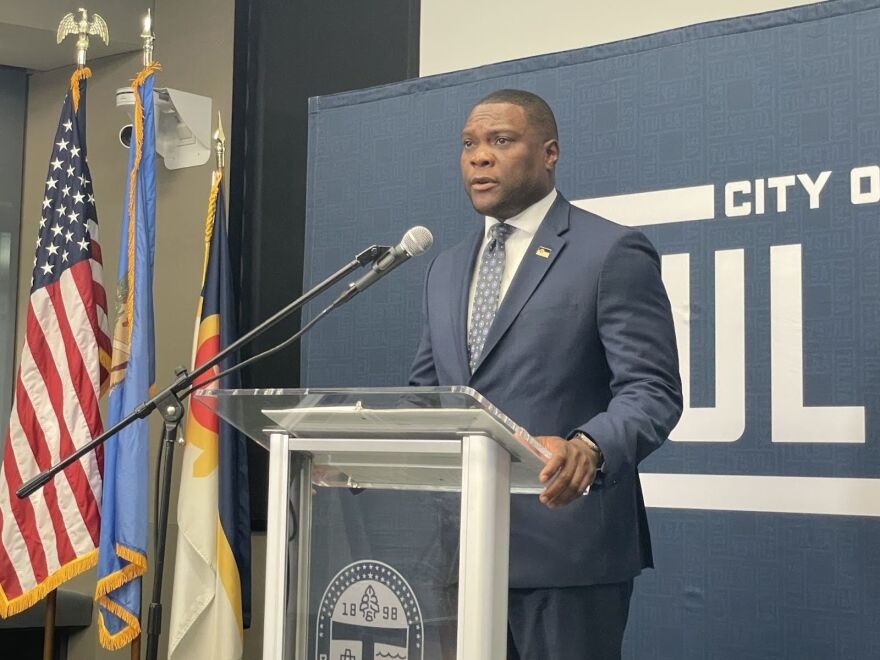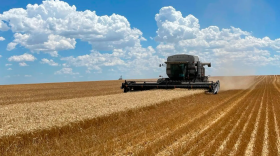Daniel Bear was driving home from the nearby Golden Pony Casino after taking his wife out for a treat on Mother's Day when he was blinded by the headlights of a Henryetta police officer.
The officer pulled Bear over for allegedly speeding eight miles over the posted limit and a busted tag light, according to police records. Bear said the officer didn't tell him he was being pulled over for going over the speed limit. When the officer asked him for his driver's license, Bear refused. He said he was a Muscogee Nation citizen, and he wanted a tribal police officer to assist in the traffic stop.
Henryetta is within the boundaries of the Muscogee Nation reservation but has no cross-deputization agreement with the tribe that would allow city police officers to arrest tribal citizens. Bear said he thought the officer would understand he had no jurisdiction to write him a traffic ticket.
"He told me, if I don't get out of the car, I'm going to drag you out of the car," Bear said.
The officer recounted a similar conversation in his written report of the incident.
Bear eventually complied and provided the officer with his state identification card, but said his driver's license had been suspended.
Bear was issued two tickets for driving with a suspended license and no insurance, even though he said he offered up his insurance card. The officer arrested Bear after learning he also had a City of Henryetta arrest warrant for failure to pay an earlier traffic ticket.
Bear was handcuffed, put into the front seat of the police car and taken to the city jail.

Bear said he felt targeted because of his tribal tag and because he asked for a Muscogee Nation Lighthorse officer to assist.
The U.S. Supreme Court held in the 2020 McGirt v. Oklahoma ruling that the Muscogee Nation reservation is Indian Country. As a result, citizens of tribal nations can't be prosecuted in state court in most of the eastern part of the state. But Henryetta is one of a number of towns that have continued to give tribal citizens traffic citations in defiance of the ruling.
The Muscogee Nation is now suing Henryetta in federal court, arguing Congress never granted states the jurisdiction to prosecute Native people for crimes in Indian Country. The tribe argues in the lawsuit that the McGirt ruling applies to cities within the nation's jurisdiction because "the only criminal powers that municipalities possess necessarily derive from Oklahoma's authority."
But that's not how Henryetta sees it.
Henryetta City Manager David Bullard told The Frontier in an interview in early June before the lawsuit was filed that the city police department was going to continue ticketing tribal citizens until he got legal guidance from Oklahoma Attorney General Gentner Drummond.
"We were handed this ruling by the Supreme Court, and I don't have a problem with it, but there was nothing given that protects us as small cities or anything like that, or gives us guidelines," Bullard said.
A spokesperson for the Attorney General's office said it does not offer legal guidance to municipalities and declined to comment.
Bullard said the dispute between the city and tribe is not about money. The city estimated it would receive around $230,000 of its $3.9 million in estimated revenue for the 2024-2025 budget year would come from fines and forfeitures, or about 6% of the city's total revenue. Bullard estimated that around one-third of that came from municipal traffic tickets. It's unclear how much of it came from tickets issued to tribal citizens.
After the McGirt ruling, cities are supposed to turn over traffic citations for Indigenous people to tribal courts. Shelby Botone, a spokesperson from the Muscogee Nation, said the tribe is likely losing hundreds of thousands of dollars in revenue from tickets.
"Funds that would support our court system, prosecutors, clerks, and law enforcement. But even more damaging than the financial loss is the erosion of our sovereignty," Botone said.
"Like any government, we rely on revenue to serve our people," she said. "When cities like Henryetta keep that money, they're not just diverting funds—they're undermining the nation's rightful authority to govern and deliver justice within our own reservation."
The Muscogee Nation doesn't have an agreement with Henryetta to share revenue from traffic tickets.
"Why all of a sudden it's our job as city, as the city police department, to do that job for nothing and take all the responsibility," Bullard said.
By comparison, police officers about 40 miles north of Henryetta in the town of Bixby are cross-deputized with the Muscogee Nation and received training from the Bureau of Indian Affairs on federal Indian law.
Over the course of this calendar year, Bixby Police Chief Todd Blish said the department has turned over 36 of the 4,300 traffic tickets it had issued so far to the Muscogee Nation.
"We check a box [that] says tribal, and then the city's court clerk forwards that directly to the Muscogee Creek Nation," Blish said.
But the city is only sending tickets from Muscogee Nation citizens to the tribe. Bixby still isn't sending traffic tickets issued to citizens of other tribes to the Muscogee Nation, as is also required under the McGirt U.S. Supreme Court decision. Blish said the city is complying with a December 2024 Oklahoma appellate court ruling that found cities can still prosecute members of other tribes within the boundaries of the Muscogee Nation.
Justice on the reservation
The Muscogee Nation filed its lawsuit in federal court on July 9 — the five-year anniversary of the McGirt decision — demanding Henryetta stop prosecuting its citizens
The lawsuit claims Henryetta's police chief told officers not to call tribal law enforcement when arresting or ticketing Muscogee Nation citizens in defiance of the law.
Geri Wisner, deputy attorney general for the Muscogee Nation, said it's been hard to get some municipalities to comply, even five years after the court ruling.
"The reality in some of the smaller municipalities is that sending the tickets was a big revenue loss," Wisner said.
Wisner said she doesn't know how many drivers are being pulled over and ticketed by city police. That's partly because she only hears about it when tribal police or drivers tell her about it.
"I am afraid there are many more out there that I am unaware of but that's what I'm working to resolve," she said.

Other Muscogee Nation citizens said in affidavits filed in the lawsuit against Henryetta that they had to pay hundreds of dollars in unlawful fines and fees. The city impounded one tribal member's vehicle, leaving them stranded in the cold, according to one affidavit filed in federal court.
Darious Tiger, another enrolled citizen of the Muscogee Nation showed up to contest a ticket written to him in December of 2024. He attempted to show his tribal identification but Henryetta Municipal Court Judge Luke Gather said it didn't matter and that the city still maintained jurisdiction over his case, according to an affidavit.
The Muscogee Nation Attorney General's office created a site called Justice on the Rez to help Native people understand their rights under the McGirt ruling. Wisner said her office can't offer legal advice to drivers who've been pulled and received a ticket in the wrong jurisdiction, but they can report it to her.
Following the Muscogee Nation filing its lawsuit against Henryetta, the city council voted on July 15 to hire outside attorneys to represent it in the case.
After the meeting, Henryetta Mayor Michael Dickey declined an interview request.
"The City of Henryetta stands firm on one particular and fundamental principle: all laws apply equally and fairly to everyone, regardless of race or ethnicity," Dickey said in a statement. "The principle is the foundation of our community, mirroring the powerful words etched on the Supreme Court building: 'Equal Justice Under Law.' Our core belief in the law guides us in every aspect of our policing. Our officers are committed to upholding the law with impartiality, ensuring that everyone in our community receives the same treatment. We're dedicated to building trust and maintaining the highest standards of justice for all."
Tulsa strikes a deal
The Muscogee Nation moved to sue the City of Tulsa in 2023 over its continued prosecution of tribal citizens for traffic tickets and other municipal offenses.
Former Tulsa Mayor G.T. Bynum was critical of the McGirt ruling.
"Do one set of laws apply to you and a different set of laws apply to your neighbor," Bynum wrote in a 2023 Facebook post.
The city argued in court that an 1898 law called the Curtis Act gave cities and towns the power to incorporate and pass their own ordinances in what was then Indian Territory. The law also abolished tribal courts as part of an effort to weaken tribal government.
Newly elected Tulsa Mayor Monroe Nichols signed an agreement with the tribe to end the lawsuit against the city in July.
Tulsa has since dismissed more than 400 cases and referred them to tribal court, according to the mayor's office.
As part of the deal, the city agreed not to prosecute Native defendants on the Muscogee Nation reservation, which includes a wide swath of Tulsa, and will refer traffic tickets to the Muscogee Nation. The city also promised to make a good-faith effort to identify whether people are tribal citizens. Nichols sees the settlement as a starting place, something that the city and the Nation can use to work through some of the technical issues instead of litigation.

A working group will meet over the next eight months to hammer out the details — everything from potential revenue sharing from traffic tickets to police pursuit policies and the cross-deputization of tribal and city police.
"What happens moving forward is actually the most important part of all that we're doing," Nichols told The Frontier and KOSU.
Tulsa County District Attorney Steve Kunzweiler was one of several Tulsa County and state law enforcement officials who joined in a statement with Gov. Kevin Stitt opposing the agreement.
Prior convictions in Tulsa's municipal court can be used to enhance subsequent charges and sentences against repeat offenders.
Kunzweiler said he believes the city and tribe should have an agreement to recognize convictions in each other's courts to hold repeat offenders accountable.
Kunzweiler said he would prefer an agreement that allows for a concurrent jurisdiction-type arrangement, where tribal defendants could be prosecuted by either city, state, tribal or federal authorities.
The right jurisdiction
Bear recently had two of his tickets dismissed by the city prosecutor in Henryetta and will be refunded the $50 he had to put up for bail, according to his lawyer, Joseph Williams.
Williams told the Frontier in a text message that the city didn't say why the tickets were dismissed or if the city was going to change its stance on prosecuting Native people.
"They have no jurisdiction, but yet, they're… doing this," Bear said. When he went to court, he said he noticed a lot of Native people waiting to pay their ticket fines to the city of Henryetta, just like he was.
"It's not right."
Bear said he still intends to pay the fines to the Muscogee Nation. He made it clear that he wants to follow the law and isn't trying to get out of the tickets.
He just wants them to be handled in the right jurisdiction.
Copyright 2025 KOSU







